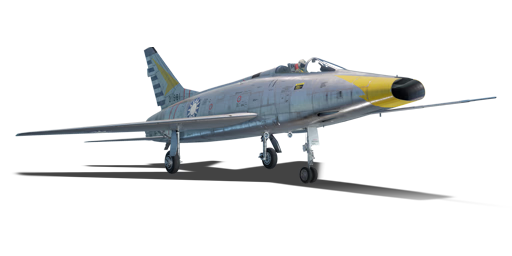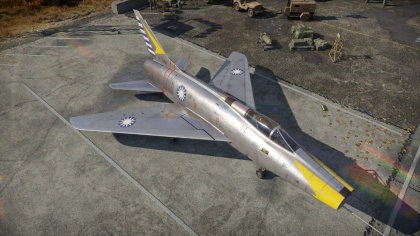Difference between revisions of "F-100A (China)"
(→modules) (Tag: Visual edit) |
(→Modules: Fixed formatting) |
||
| Line 91: | Line 91: | ||
! colspan="2" |Flight performance | ! colspan="2" |Flight performance | ||
!Survivability | !Survivability | ||
| − | ! colspan=" | + | ! colspan="3" |Weaponry |
| − | |||
|- | |- | ||
|I | |I | ||
| Line 106: | Line 105: | ||
| | | | ||
|Airframe | |Airframe | ||
| − | |Offensive | + | |Offensive 20 mm |
| | | | ||
| − | |AGM-12B | + | |AGM-12B Bullpup |
| − | Bullpup | ||
|- | |- | ||
|III | |III | ||
| Line 123: | Line 121: | ||
| | | | ||
|Cover | |Cover | ||
| − | |New | + | |New 20 mm cannons |
| | | | ||
|AIM-9B | |AIM-9B | ||
Revision as of 13:14, 29 May 2020
Contents
Description
The ␗F-100A Super Sabre is a rank Chinese jet fighter
with a battle rating of (AB), (RB), and (SB). It was introduced in Update 1.97 "Viking Fury".
The first supersonic jet available in the ROCAF fighter line of the China tree, the F-100A is an early variant of the famous "Super Sabre", though in Taiwanese service it received a number of upgrades to bring it up to par with later models. Compared to the fighter-bomber F-100D, it has a smaller wing with a straight trailing edge, fewer hardpoints, and no flaps.
Weighing more than 3 tons lighter than the F-100D but powered by the same engine, the F-100A has different handling characteristics and is more suited performance-wise for air-to-air combat. The tradeoff is its more limited weapons selection; while it can still carry goodies like the AGM-12B Bullpup and the AIM-9B Sidewinder, its bomb selection is far more limited, unguided rockets are unavailable, and it lacks access to the more advanced AIM-9E Sidewinder.
General info
Flight performance
Describe how the aircraft behaves in the air. Speed, manoeuvrability, acceleration and allowable loads - these are the most important characteristics of the vehicle.
| Characteristics | Max Speed (km/h at 10,671 m) |
Max altitude (metres) |
Turn time (seconds) |
Rate of climb (metres/second) |
Take-off run (metres) | |||
|---|---|---|---|---|---|---|---|---|
| AB | RB | AB | RB | AB | RB | |||
| Stock | ___ | ___ | __._ | __._ | __._ | __._ | 900 | |
| Upgraded | ___ | ___ | __._ | __._ | __._ | __._ | ||
Details
| Features | |||||
|---|---|---|---|---|---|
| Combat flaps | Take-off flaps | Landing flaps | Air brakes | Arrestor gear | Drogue chute |
| X | X | X | ✓ | X | ✓ |
| Limits | ||||||
|---|---|---|---|---|---|---|
| Wings (km/h) | Gear (km/h) | Flaps (km/h) | Max Static G | |||
| Combat | Take-off | Landing | + | - | ||
| N/A | N/A | N/A | ~11 | ~4 | ||
| Optimal velocities (km/h) | |||
|---|---|---|---|
| Ailerons | Rudder | Elevators | Radiator |
| < 640 | < 540 | < 610 | N/A |
Survivability and armour
Examine the survivability of the aircraft. Note how vulnerable the structure is and how secure the pilot is, whether the fuel tanks are armoured, etc. Describe the armour, if there is any, and also mention the vulnerability of other critical aircraft systems.
Armaments
Offensive armament
Describe the offensive armament of the aircraft, if any. Describe how effective the cannons and machine guns are in a battle, and also what belts or drums are better to use. If there is no offensive weaponry, delete this subsection.
Suspended armament
Describe the aircraft's suspended armament: additional cannons under the wings, bombs, rockets and torpedoes. This section is especially important for bombers and attackers. If there is no suspended weaponry remove this subsection.
Defensive armament
Defensive armament with turret machine guns or cannons, crewed by gunners. Examine the number of gunners and what belts or drums are better to use. If defensive weaponry is not available, remove this subsection.
Usage in battles
Describe the tactics of playing in the aircraft, the features of using aircraft in a team and advice on tactics. Refrain from creating a "guide" - do not impose a single point of view, but instead, give the reader food for thought. Examine the most dangerous enemies and give recommendations on fighting them. If necessary, note the specifics of the game in different modes (AB, RB, SB).
Modules
| Tier | Flight performance | Survivability | Weaponry | |||
|---|---|---|---|---|---|---|
| I | Fuselage repair | Compressor | M117 | |||
| II | New boosters | Airframe | Offensive 20 mm | AGM-12B Bullpup | ||
| III | Wings repair | Engine | M65 | |||
| IV | G-suit | Cover | New 20 mm cannons | AIM-9B | ||
Pros and cons
Summarise and briefly evaluate the vehicle in terms of its characteristics and combat effectiveness. Mark its pros and cons in the bulleted list. Try not to use more than 6 points for each of the characteristics. Avoid using categorical definitions such as "bad", "good" and the like - use substitutions with softer forms such as "inadequate" and "effective".
Pros:
Cons:
History
In the early Cold War era, the Republic of China Air Force was equipped with quantities of US jet aircraft like the F-86 Sabre and F-84 Thunderjet, which were used in clashes with the People's Republic of China over the Taiwan Straits. Amid growing conflict in 1958, a number of assorted F-100 Super Sabres were delivered to Taiwan, including the F-100A, the two-seat F-100F, and the reconnaissance RF-100A. The former were upgraded with a number of features from the latest F-100D, such as a taller vertical tail fin and wiring for Sidewinder missiles. Another batch of F-100s was delivered in the 1970s, and the type remained in service until the 1980s.
The F-100 was not an easy aircraft to handle and several were lost in accidents. The details of their combat experiences are unclear. They may have fought with PLAAF jets but it is unknown if any kills or losses were scored. The RF-100As in particular were only used for about two years before being returned to the United States due to unsatisfactory capabilities and maintenance issues. The ROCAF was the only foreign user of the F-100A.
The vehicle represented in War Thunder appears to have been upgraded with the F-100D's J57-P-21 engine instead of the original J-57-P-7 or P-39 engines used by the F-100A in USAF service.
Media
Excellent additions to the article would be video guides, screenshots from the game, and photos.
See also
Links to the articles on the War Thunder Wiki that you think will be useful for the reader, for example:
- reference to the series of the aircraft;
- links to approximate analogues of other nations and research trees.
External links
Paste links to sources and external resources, such as:
- topic on the official game forum;
- encyclopedia page on the aircraft;
- other literature.
| North American Aviation | |
|---|---|
| Fighters | |
| P-51A | P-51 · P-51A |
| P-51C | P-51C-10 |
| P-51D | P-51D-5 · P-51D-10 · P-51D-20-NA · P-51D-30 |
| P-51H | P-51H-5-NA |
| Twin-engine fighters | F-82E |
| Jet fighters | F-86A-5 · F-86F-2 · F-86F-25 · F-86F-35 · F-100D |
| Strike aircraft | A-36 · PBJ-1H · PBJ-1J |
| FJ-4B · FJ-4B VMF-232 | |
| Bombers | B-25J-1 · B-25J-20 |
| Export/Licence | ▂B-25J-30 · ␗B-25J-30 |
| ▄Mustang Mk IA · F-6C-10-NA · ␗P-51C-11-NT · ␗P-51D-20 · J26 David · J26 · P-51D-20-NA · ␗P-51K | |
| F-86F-30 ▅ · ␗F-86F-30 · F-86F-40 ▅ · F-86F-40 JASDF▅ · ␗F-86F-40 | |
| ◄F-86K · ▄F-86K (Italy) · ▄F-86K (France) | |
| ␗F-100A · ▄F-100D · ␗F-100F | |
| Captured | ▅P-51C-11-NT |
| Canadair Limited license-built the F-86 as the CL-13 for use in Canada and export to Europe. | |
| Fiat license-built the F-86K for the Italian Air Force though another 120 NAA built F-86Ks were also sold to the Italians. | |
| See Also | Mitsubishi Heavy Industries · Canadair Limited · Fiat Aviation |
| China jet aircraft | |
|---|---|
| Fighters | J-2 · J-4 · J-6A · J-7II · J-7D · J-7E · J-8B · J-8F · J-10A · J-11 · J-11A |
| Strike aircraft | Q-5 early · Q-5A · Q-5L · JH-7A |
| Bombers | H-5 |
| France | ␗Mirage 2000-5Ei |
| USA | ␗F-84G-21-RE · ␗F-84G-31-RE · ␗F-86F-30 · ␗F-86F-40 · ␗F-100A · ␗F-100F · ␗F-104A · ␗F-104G · ␗F-5A · ␗F-5E · ␗F-16A MLU |
| USSR | ␗MiG-9 · ␗MiG-9 (l) |
| North Korea | Shenyang F-5 |
| Pakistan | A-5C · JF-17 |





